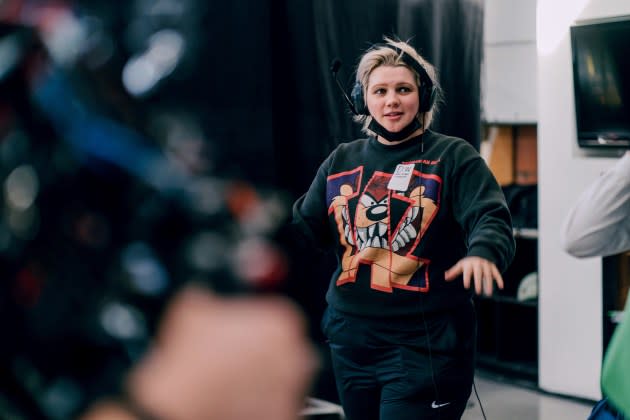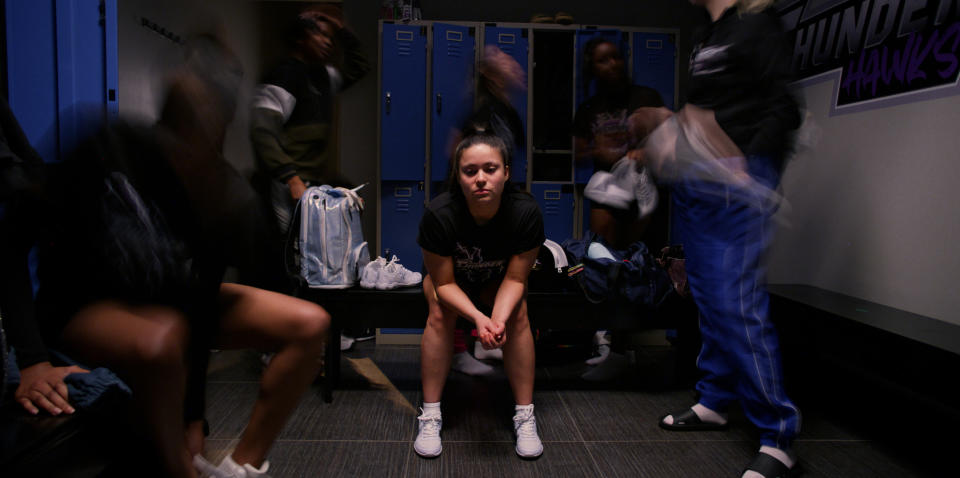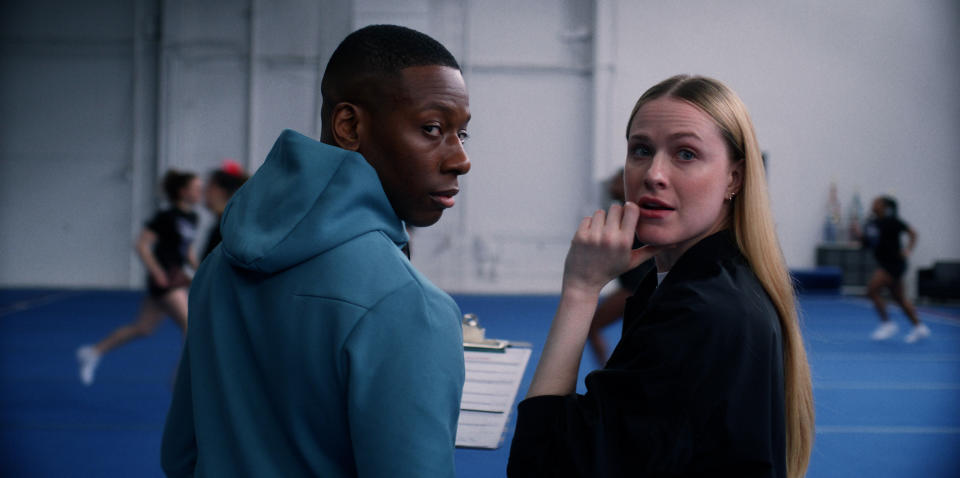‘Backspot’ Director D.W. Waterson On Grueling Determination And Inspirations Behind Queer Cheerleading Film

D.W. Waterson’s cheer drama Backspot, also produced by Elliot Page under Page Boy Productions, aims to tell a more well-rounded and ambitious story about the seemingly glamorous but occupationally hazardous world of competitive cheerleading. The film follows Riley (Devery Jacobs), an ambitious cheerleader hell-bent on perfection, as she, alongside her girlfriend (Kudakwashe Rutendo) and their best friend (Noa DiBertro), land highly competitive spots on a prestigious all-star cheerleading squad led by an overbearing head coach (Evan Rachel Wood) and her presiding assistant coach Thomas Antony Olajide). The film acts as a multi-hyphenate social commentary on queerness, mental health and coming-of-age tale for young women in sports.
Here, Deadline talks to Waterson about executing the perfect shot, casting their star leads and cinematic inspirations.
More from Deadline
Devery Jacobs To Receive 2024 Breakthrough Award At ATX TV Fest
Elliot Page Drama 'Close To You' Acquired By Greenwich Entertainment
DEADLINE: What were some of the films that inspired Backspot?
D. W. WATERSON: Bend It Like Beckham had a huge influence on me growing up. Since it was a sports film focused on young people, it was also well done from a cinematic standpoint. Thirteen is such a crucial film about going through the realness and rawness of what it means to be a young person, which I feel really influenced the anxiety and the mental health in the film. And it was the breakout film for Evan Rachel Wood. Black Swan for the pressure. Ballet is a feminine sport, but seeing how hard it is on the body was influencing. And then, Whiplash, it’s a fantastic film and there is so much rhythm to it.
DEADLINE: What research went into creating a movie about a cheerleading squad? Do you have a cheerleading background?
WATERSON: I’ve been working with a cheer team for five years. I grew up kind of in a sports household, so sports was always playing in and around me. I played different sports, but my athleticism was music and playing drums. I’m also a DJ, and as I’ve been DJing over the past 10 years in Toronto, I would wear a cheerleading uniform. And I think it was through wearing that uniform that I kind of realized there is a superhero suit to this cheer. And it does something to the audience. And cheerleading is such a pop culture, zeitgeist sport. But I was like, “Well, what’s behind that?” Like Black Swan, you think of ballet, and it’s pretty and feminine, and then you see how grueling it is on the body.
Working with a sports cheerleading team for the past five years, we did a proof of concept with them because when I was talking about this film, nobody really got it. When they think cheerleading, they think Bring it On, comedies, and cute girls in short skirts. And I’m like, “No, no, no. I’m talking about concussions. I’m talking about blood, sweat, pushing your body to the limit.” They are throwing bodies in the air. Name me another sport that does that. And so it was really being around these cheerleaders that I was able to see the full spectrum. And then also so much silliness and camaraderie, and they really are a family. And when it’s like, hit the mat, do a drill, they stand to attention and perform these amazing feats. And then, as soon as they’re wrapped for the day or finished practice, they’re laughing uncontrollably, being super silly, and pounding burgers. It’s crazy.

DEADLINE: Five years from page to screen?
WATERSON: Probably around six or seven years. From original concept to bringing in Joanne Sarazen as a writer, I had the skeleton of what I wanted to accomplish with this story, and I knew the beats I wanted to hit. Then, four years of just really refining a script and then slowly bringing on producers and production companies and Elliot Page joining, and then all of a sudden, Evan Rachel Wood is involved. So, we felt like the little indie that could. Nobody thought a cheerleading movie could go that far. We were turned away from grants left and right, and we were just getting no’s left right. But we believed in the film; we believed in the sport. We believed that cheerleaders deserve their time in the spotlight of being seen as true athletes. And now we have a theatrical release across Canada and the US, so it’s pretty crazy.
DEADLINE: The concept of the “cheerleading” movie is so fun because they really do run the gamut of genres. You can have cheerleaders who solve crimes, cheerleaders who do bank heists because they’re struggling financially, and queer cheerleaders. If we look past the cheer background in his film, we see a narrative about a teen basically trying to live her life and seeking acceptance and approval, which are relatable themes. But why tell the story through the narrative of cheerleading?
WATERSON: It’s a world that’s super campy that we’ve never seen grounded before. That’s what interested me. There’s a lot of sparkles and glitters, but what’s behind that? And also, the high intensity of that. It’s not like other sports where you go out and play a series of games, and whoever wins the most gets one shot, and you have two and a half minutes. You stick it, you hit your performance, or you don’t. And that really dictates everything. You’re competing against yourself. I think this is because I wanted to explore Riley’s sense of self, the pressure she puts on herself, and the influence of other characters around her. I felt like that the perfect place to set the story was in cheer, where you’re competing against your own.
DEADLINE: There’s something really interesting about how you focus on the body movements because it’s about cheerleading, and there’s a gratefulness to it. But you also show the grit, the damage, and the bruises and blisters. Riley also has trichotillomania that manifests in plucking her eyebrows under duress. Why was it important for you to depict these things?
WATERSON: I think with anybody in the world, what we put our bodies through for work or leisure really says something about us. And we always see everybody’s finished result, right? We live in a social media world. You see the final performance, you see the final result of something, but you never see the lead-up, you never see the sacrifice. And for me I really wanted to see, what are these young athletes sacrificing? And what are they sacrificing for the rest of their lives? You get enough concussions that’ll impact you for the rest of your life. Wrists, knees, shoulders, they are making that sacrifice, whether they know it or not, in those moments for a taste of perfection, which I thought was intriguing to dig into.
DEADLINE: Let’s get into some of these dynamics. You have Coach Eileen, the girls’ queer cheer coach. Riley looks up to her, but Eileen sort of rejects this idea and doesn’t want to be seen as a mother figure for her. Can you talk about the choice to make her this tough character rather than leaning into being more empathetic?
WATERSON: The main core of me wanting to dig into this story was to explore friction and tension within the queer world. And that can exist between different generations. What an older generation got in terms of freedoms and rights is going to be a lot different from what I’m experiencing, which is going to be a lot different from what a younger generation is experiencing. And sometimes, there’s bitterness. They fought so hard for me to have the rights that I have, and from their perspective it can be seen sometimes that it’s taken for granted. And sometimes those other generations really try to be like, “It was hard for me, so I’m going to make it hard for you because I’m going to help thicken up your skin.” And I really wanted to get into that dynamic.
Not every mentor is going to be a good mentor. Not every mentor is capable of being a mentor. And Eileen has her own shit. She’s going through her divorce. Me and Evan worked on the backstory of Eileen, of it’s a fresh divorce; she probably was out early on in her life and got really bullied for being gay. And I think Evan and I working on that character development before even hitting set helped solidify who she was. She was a hardened person from life experience, and trying to relay that information to Riley, but not in a good way.
DEADLINE: I’d be remiss if I didn’t talk about the rest of the cast in general. I love the dynamic between Devery, Evan, and Thomas Antony Olajide. The bond they all have in this movie is so endearing. What went into casting?
WATERSON: Well, Joanne, Devery, our producer Alona Metzer, and Thomas, who plays Devin, we all went to a film institute together, so that’s where we kind of all met. So, writing Devin, we really wanted to make sure we had this character who was loving. My favorite scene in the movie is where he talks Riley back to his place to take care of her after a wild night out. I loved seeing Thomas and Devery work together and just him being so tender and loving. I think it’s what we all wanted as a teenager, this kind of elder queer mentor to just be firm but loving and reiterating, “Love yourself.” But that role was written for him. He’s an incredible actor. Getting to work with him and Devery was one of my favorite moments on set.
I feel so blessed to have producers who just said, “Cast who you want.” That was it; I got to cast exactly who I wanted. I watched over 100 audition tapes to ensure I was combing through everybody in terms of looking for the girls and making sure they had athletic ability. Being able to cast who I wanted and work with these incredible young people who are so unbelievably talented was the best. And then obviously having Evan. I remember working with Page Boy Productions and Elliot, they were like, “OK, Coach Eileen, who do you want? Let’s write a list. You’ll probably get nobody on the list, but we’ll try.” And number one was Evan Rachel Wood. I remember being on the call with her once we found out that she was interested, and her agent was like, “All right, Evan’s interested. Let’s set up a call.” And in that call she brought up that it reminded her of Thirteen. And the way Holly Hunter saw that film and was a name at the time and wanted to go in and lift up Catherine Hardwicke, and Evan was like, “I kind of want to pass the torch and come and do that for you guys.”
Which was a crazy moment, to be staring at Evan’s face and having her tell me that my script reminds her of Thirteen. She was so great to work with. Her professionalism on set, just… everybody’s raised that week that we had her. We only had her for five days on a 17-day shoot, but by the end of those five days…
DEADLINE: Wait, 17 days? This movie was made in 17 days? That’s wild.
WATERSON: Yup. And then, at the end of having Evan for five of those 17 days, she turned to me and was like, “You’re the shit. You’re the real deal.” She was like, “You’re one of the best directors I’ve worked with.” And so to go through that whole process and have a vet like her who’s so experienced turn around and say that, I’m like, “OK, I’m on the right track. Let’s go. Let’s knock this thing out of the park.”
DEADLINE: You mentioned Elliot Page’s production company being a part of this. How did that come about? What was the collaboration process like?
WATERSON: Elliot and Page Boy reached out to Devery because he’s a big fan of Reservation Dogs, just for a general meeting. And it was in that meeting, Devery was like, “I’m working on Backspot. We have a script, we’re ready to shoot. We’re just trying to finance.” And queer cheerleading, obviously; I don’t know why those things always go together in the queer world, but they seem to. And so, he was like, “OK, give me the script. I want to read this.” And they read the script, loved it, and came back and said, “We want to come on board as EPs.” And they’ve been so incredibly supportive. Matt Jordan Smith and Tuck Dowrey were on set every single day, making sure that all the queer creatives felt supported, and we had as much as we could have in terms of making sure we were producing a top-quality film. And even through the press and everything, they’ve just been on the ground making sure we have what we need to try to make this film as big as we can.

DEADLINE: The routines that the cheerleaders do in this movie are intense. As a debut feature film director, I’m guessing this had to be the most challenging part of filming.
WATERSON: The big montage in the middle of the film to Prodigy, which was my favorite thing to edit, and landing that track, I would just kind of pick up shots wherever I could. I love a good montage; I absolutely love visual storytelling. And we would have times where we’re like, “OK, here we’re going to go full out, and we’re just going to capture it.” Because that montage was to really show what they do in multiple practices, but I would just turn to the cheerleaders and be like, “OK, what part of your body do you feel good about?” They’re like, “I love my calves. They’re super strong.” I was like, “Cool, show me a move that highlights that.” Or, like, “Show me a move that you really hate during training, but you know that it makes you a better performer.” And the cheerleaders were just so game to be like, “We want to make sure that you’re getting the authentic representation of what training as a cheerleader looks like.”
And then, for the big one-er, we worked through that choreography in pre-production. And what some people may not think about is the DP, our Steadicam operator James Poremba, he had to be choreographed too. He was kind of like the 13th cheerleader because if he’s going this way and a cheerleader’s doing a back handspring, you’re going to hit the camera. So, we really delicately had to kind of weave him in. I feel like when you’re working with actors and it comes to stunts and when it comes to athletes, you’re so used to it cutting away where you’re like, “Here’s a close-up of the actor, and here’s a wide and it’s the stunt double.” And I was like, “I want people to know this is what it is…” And to slow it down in slow motion so people could see the intricacies and the details of what these women are doing in hyper speed.
And also, kind of pushing in and out, so it’s not just about the big presentation. When you think of cheerleading, you think of the flyer, you think of this whole group—but being able to move in and show Riley in the thick of this crazy moment, lifting her teammate up that she just pressed down into the splits two weeks earlier. I thought that that was such a special moment in really highlighting those intricacies and the fact that at the end of it, the team did it, and Riley did it her way. Not necessarily Eileen’s way, but she did it her way, which I think was the takeaway I want the audience to walk away with.
Backspot is now playing in theaters across theaters in the U.S. and Canada
[This interview has been edited for length and clarity]
Best of Deadline
2024 Premiere Dates For New & Returning Series On Broadcast, Cable & Streaming
'Knives Out 3': Everything We Know About The Second Rian Johnson Sequel
Hollywood & Media Deaths In 2024: Photo Gallery & Obituaries
Sign up for Deadline's Newsletter. For the latest news, follow us on Facebook, Twitter, and Instagram.


